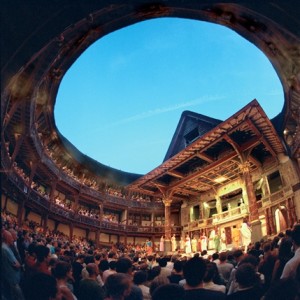
300.1K
Downloads
447
Episodes
New for 2023: Victorian Poetry Scroll back for previous courses on Shakespeare, Eighteenth Century Poetry, Close Reading, Various film genres, Film and Philosophy, the Western Canon, Early Romantics, 17th Century Poetry, etc.
Episodes

Thursday May 04, 2023
Thursday May 04, 2023
We look at Yeats a little more, then "Michael Field," and then Housman's poem about Wilde and other poems about his own sexuality, and about the intense, Horatian ephemerality of life. A class in part about why I hope poetry, or some poems, will matter to the students throughout their lives.

Monday May 01, 2023
Monday May 01, 2023
Wilde in prison, or in Dante's hell, and the differences and similarities between the grimness of "The Ballad of Reading Gaol" and the charming, dazzling self-delight of his earlier self-presentations, in a class guest-taught by Princeton's Professor Jeff Nunokawa.

Friday Apr 28, 2023
Friday Apr 28, 2023
Another Kipling poem -- "Danny Deaver" and the horror of hanging (in partial anticipation of Wilde's "Ballad of Reading Gaol"), and some discussion of Arnold, Pater, and Wilde as context for Lionel Johnson's "Dark Angel." Then two versions of Yeats's "Cradle Song."

Monday Apr 24, 2023
Victorian Poetry 23: Amy Levy, Robert Bridges and... Kipling
Monday Apr 24, 2023
Monday Apr 24, 2023
We discuss one poem of Amy Levy in the context of her short and painful life, then look at Robert Bridges's version of sprung rhythm -- how it differs from his friend Hopkins's and then after a brief and fractional defense of Kipling from the worst that could be said about him, we consider his poem "In the Neolithic Age."

Friday Apr 21, 2023
Friday Apr 21, 2023
The way metaphor works in one of Stevenson's songs of travel, a little attention to George R. Sim's punning in one of his "lunatic laureate" poems, and then close reading of the amazing Alice Meynell, in particular "Renouncement," "A Cradle Song," "The Modern Mother," and "Parentage," with some attention to the experience of Catholic guilt.

Monday Apr 17, 2023
Monday Apr 17, 2023
We look at an interesting poem by Louisa S. Guggenberger, a very short poem by George MacDonald, and a couple of formal experiments by Stevenson, which mean the explanation of pantoum-like poems and triolets or rondeaux more generally -- examples of triolets from Hopkins and Chesterton. Then the sublime original envoy to A Child's Garden of Verses.

Tuesday Apr 04, 2023
Victorian Poetry 20: George Eliot, Hardy, Hopkins
Tuesday Apr 04, 2023
Tuesday Apr 04, 2023
A lot of greats to do in a single day, and not wanting to miss Eliot we begin with a little contextualization of three of the sonnets from "Brother and Sister," then move on to a few grim Hardy poems, and then to Hopkins: "As kingfishers catch fire" compared with one of the "terrible sonnets," "I wake and feel the fell of dark, not day."

Thursday Mar 30, 2023
Victorian Poetry 19: Swinburne and Hopkins
Thursday Mar 30, 2023
Thursday Mar 30, 2023
We discuss "The Garden of Proserpine" and the ways that it anticipates or instantiates Freud's idea of the death drive: all the repetitions in the poem. Then we turn to the poet most opposite in attitude: Hopkins, and talk briefly of "Pied Beauty" and "That Nature is a Heralcitean Fire." Discussion in Instress and the Duns-Scotian term haecicity that makes it possible, as opposed to Thomas Aquainas' universality. We'll finish considering Hopkins next class.

Monday Mar 27, 2023
Monday Mar 27, 2023
We have to abandon Fitzgerald because time is short, so mainly on to Modern Love, with some context, then Hopkins's "Binsey Poplars," Swinburne (and Buck Mulligan quoting The Triumph of Time in Ulysses), and an intro to "The Garden of Proserpine," via Spenser's "Garden of Adonis" in The Faerie Queene (which I discussed a little while ago here), and Milton's account of how Eden is even greater than the fair field of Enna where Persephone gathering flowers by gloomy Dis was gathered.

Thursday Mar 23, 2023
Victorian Poetry 17: Some Meredith, then we begin The Rubáiyát of Omar Khayyam
Thursday Mar 23, 2023
Thursday Mar 23, 2023
We talk about George Meredith for a while -- "Lucifer in Starlight" (and the 1882 transit of Venus) and his relation to his wife, Mary Ellen Nicolls, and the relationship of both of them to Henry Wallis who'd painted Meredith as Chatterton. We plan to return to Modern Love, but first we begin reading through Fitzgerald's Rubáiyát of Omar Khayyam, after quoting him on its form and its moral: "Drink--for the Moon will often come round to look for us in this Garden and find us not."

Tuesday Mar 21, 2023
Victorian Poetry 16: A little Patmore, then the rest of Goblin Market
Tuesday Mar 21, 2023
Tuesday Mar 21, 2023
A couple of poems by Patmore, a somewhat tedious excursus into propositional attitudes and game theory, then the rest of "Goblin Market."

Wednesday Mar 15, 2023
Victorian Poetry 15: D.G. and C. Rossetti
Wednesday Mar 15, 2023
Wednesday Mar 15, 2023
We conclude our discussion of D.G. Rossetti's "Blessed Damozel," paying particular attention to the passages in parentheses and the subtlety of what they suggest about the speaker's sense of the Blessed Damozel's perception of him. We then move on to begin reading "Goblin Market," trying not so subtle account of its subtle sexuality -- or maybe it would be better to say a subtle account of its not so subtle sexuality

Monday Mar 13, 2023
Victorian Poetry 14: D.G. Rossetti and pre-Raphealitism
Monday Mar 13, 2023
Monday Mar 13, 2023
A brief introduction to Pre-Raphaelite poetry and painting: the perceptual psychology that it brings us to notice. A close reading of Dante Gabriel Rossetti's amazing "Woodspurge." A little bit on his "Blessed Damozel," followed, via a Mr. Magoo-inflected reading of Lewis Carroll's "Mad Gardener's Song," by a more general consideration of rhyme and in Victorian poetry and the question of its prominence or lack thereof: important as well to "The Blessed Damozel," but we ran out of time and may not get to discuss this next class, when we will certainly do Christina Rossetti.

Wednesday Mar 08, 2023
Victorian Poetry 13: Concluding class on Clough’s ”Amours de Voyage”
Wednesday Mar 08, 2023
Wednesday Mar 08, 2023
What amours de voyage are. What it means to idealize what Keats calls "The fair creature of an hour," as Claude does. How such idealizations derive from "Juxtapositions." What it means to see through one's own idealization, by understanding its biochemical substrate. What's wrong with seeing through that idealization. With examples from Proust (and his differences from Freud). All relevant tangents, or so I think. With some interesting information about Andrea Aguyor.

Tuesday Mar 07, 2023
Victorian Poetry 12: Mainly Clough plus some narrative theory
Tuesday Mar 07, 2023
Tuesday Mar 07, 2023
Mainly Clough, mainly a kind of intro to Amours de Voyage, with some historical (Mazzini, Garibaldi) and biographical context as well as context in narrative theory, especially of the epistolatory novel. Clough the atheist and port-Darwinian, and his views of nature. Then a quick and fun reading of "The New Decalogue," and a plan to return to Amours de Voyage next class.

Friday Mar 03, 2023
Friday Mar 03, 2023
Most of the class is on Edward Lear, and what his kind of nonsense poetry (very different from Carroll's) tells us about how poetry works in general. Then a return to Clare, to complete "The Winters Spring."

Monday Feb 27, 2023
Victorian Poetry 10: ”The Hunting of the Snark” and some Clare
Monday Feb 27, 2023
Monday Feb 27, 2023
We begin talking about Carroll's "The Hunting of the Snark" and what makes comic poetry what it is -- making the arbitrary tight (the way OuLiPo does, so this is this semester's excursus on OuLiPo). Then a little about the plot that some of the students may have missed. Following which, an introduction to John Clare, and the first stanza of his poem "The Winters Spring," which we'll continue with next class.

Tuesday Feb 21, 2023
Victorian Poetry 9: ” ’Childe Roland to the Dark Tower Came’ ”
Tuesday Feb 21, 2023
Tuesday Feb 21, 2023
Having considered the title in the last class, we do the whole of R. Browning's " ' Childe Roland to the Dark Tower Came' " today, looking at how he (Browning/ Roland) undoes the difference between success and failure: "Just to fail as they seemed best, / And all the doubt was now - should I be fit?"

Tuesday Feb 14, 2023
Tuesday Feb 14, 2023
We start with a few lines from much later in EBB's Aurora Leigh (and their near explicit critique of Tennyson), then finish discussing "Development" (and its relation to modernity), then look at Pope's translation of the Thamyris passage in Book II of The Iliad, and the surviving fragments of Sophocles's play about him, and then spend the class on "Thamuris Marching," which has Aristophanes describing Sophocles's play in terza rima, and we end with the title of "'Childe Roland to the Dark Tower Came'" the poem to which we'll return next class.

Saturday Feb 11, 2023
Victorian Poetry 7: more on Aurora Leigh and then some Robert Browning
Saturday Feb 11, 2023
Saturday Feb 11, 2023
Feminism and poetry for EBB. Poetry as a counter to an industrialized world and the constraints its analysts try to put on poetry. We begin discussing Robert Browning's moving late poem "Development," which shows an attitude similar to EBB's.

Wednesday Feb 08, 2023
Victorian Poetry 6: mainly Elizabeth Barrett Browning
Wednesday Feb 08, 2023
Wednesday Feb 08, 2023
A couple of great student modernizations of Barnes' "The Turnstile" (worth listening to! Don't fast forward) and then some discussion of the subtleties of Barrett Browning's Aurora Leigh, and its relation to the rise of the 19th century novel (Jane Eyre), with some attention to just a few lines of Book 1 of the poem.

Thursday Feb 02, 2023
Victorian Poetry 5: E. Brontë, dialect, the amazing William Barnes
Thursday Feb 02, 2023
Thursday Feb 02, 2023
Poetry and nature as the surrounding world is industrialized; dialect and the local; experienced attitudes towards prior innocence; what "tomorrow" means in Brontë; dialect spelling; and then the amazing and heartbreakingly moving William Barnes, especially his poem "The Turnstile."

Monday Jan 30, 2023
Monday Jan 30, 2023
First some process shot accounts of 19th c. affiliations between a lot of the figures we're doing. Dialectic poetry. Rubaiyat stanzas. Then Tennyson's great "Tithonus" with some attention to its similarities and differences from "Ulysses"

Thursday Jan 26, 2023
Victorian Poetry 3: Tennyson’s technique, Tennyson’s despair
Thursday Jan 26, 2023
Thursday Jan 26, 2023
A consideration of the opening of "The Lotos Eaters" and the amazing way Tennyson handles sound. Repetition. How he does something similar in some despairing stanzas from "In Memoriam."

Monday Jan 23, 2023
Victorian Poetry 2: The weirdness of Tennyson
Monday Jan 23, 2023
Monday Jan 23, 2023
One of Tennyson's epigraphs: "Astronomy and geology: terrible muses." The importance of Arthur Henry Hallam's death to Tennyson, especially because of his religious skepticism. Gibbon on St. Simeon Stylites. Dramatic Monologues. "Ulysses," in Carey's translation of Dante and then Tennyson's poem. The great Achilles = Hallam, but we know the ending from Dante -- he won't see him again.
